- Home
- Terry C. Johnston
Buffalo Palace tb-2 Page 6
Buffalo Palace tb-2 Read online
Page 6
“Yes,” replied the thin one. “By all means. None of us particular like watching a naked man shake and shrivel up afore our eyes.”
With a grateful nod Bass turned to the mare, patted her on the neck, and retrieved his shirt, britches, and boots from beneath the ropes lashing the bundles to the horse’s back.
As Titus began to hop one-legged into his leather britches, the thin man out front asked him, “What the devil are you doing up here from St. Louis?”
“Headed west.”
“West?” the fat man demanded in a gush. “West, from here?”
“What you aim to do going west?” the thin one demanded. “Off to Santa Fe all by yourself?”
Stuffing the wooden buttons through their holes in the britches, Bass shook his head. “Ain’t going south to Santy Fee. Pointing my nose out yonder to them mountains.”
“You don’t say?” the third one replied with a bit of wonder. For the most part, he had been all but silent.
Bass dragged his yoke-shouldered linen shirt over his sopping wet head and asked, “You got room to put a man up for the night?”
“Do we, Sergeant?” the fat one asked. He let the Harpers Ferry musket droop until it pointed at the ground.
“I don’t know about putting you up here at the post,” the thin one began.
“Then I’ll just set myself up right out here,” Titus responded.
“Aw, c’mon, Sergeant,” the big-bellied man pleaded. “We ain’t none of us had no one new to talk with inside of weeks.”
“That’s right,” the third one agreed. “Maybe he’s got some news from downriver what ain’t gone rotted with time.”
Jabbing his big horse pistol into the waistband of his military breeches, the thin man inquired, “You ain’t a scout from one of them fur outfits, are you? Rest of ’em coming ’long behind you?”
On the ground where he plopped to pull on his boots, Bass declared, “Like I said, I’m on my lonesome.”
“And you know exactly where the hell you’re going?”
Titus pointed quickly in the general direction. “West. Out yonder.”
The younger, thin man with the beaklike nose chuckled, then said, “So do you know where you are?”
“I’m on the Missouri River,” Bass replied, flinging a thumb over his shoulder at the frothy, muddy, runoff swollen water. “Still east of the big bend.”
“Ain’t that far to the bend now!” the third man cheered.
“How far?” Titus replied eagerly, standing, stomping his heels down into the old boots.
With a shrug the older man said, “Not far. I never was one to measure things out exact.”
“He’s right,” the sergeant injected. “So you reach the big bend, what’s that mean to you?”
“Means the Missouri heads north,” Bass replied. “And me with it.”
With a bob of his head the big soldier said, “Sounds like he’s got him a notion of where he’s off to, Sergeant.”
“Could be, Culpepper,” the thin one replied, jabbing his thumb over his shoulder at the stockade for emphasis. “But—still don’t sound like he knows where he’s landed.”
Titus tugged the broad-brimmed hat firmly down on his head. “You mean this here post on the Missouri?”
The sergeant swelled out his chest proudly, swinging an arm expansively, proudly, over all his regal holdings. “Osage, it’s called,” he offered. “Fort Osage.”*
* * *
It was a sometimes proposition, this Fort Osage was.
During the early 1820s it had become the jumping-off point for those traders headed down the Santa Fe Trail.
“But there’s been a post here back to O-eight,” the thin man called Lancaster explained as they sat With Titus at the stone fireplace in what served as the fort’s mess hall.
From the size of the stockade down to the tiny barracks, it was plain for any visitor to see that a large force had never manned Fort Osage.
“That’s back when General Clark chose this here place for a government trading house,” Sergeant Clayton explained. “I s’pose that’s why to some folks this place’ll always be known as Fort Clark.”
In fact, to those on the Lewis and Clark expedition marching west to the Pacific Ocean, this location was first noted as a favorable site for a post and ever after became known as Fort Point on June 23, 1804—perhaps because of the low bluff on which the post would be eventually situated. The red-haired William Clark again passed by the site early in the fall of 1808 with a troop of dragoon cavalry on his way to make a treaty with the Osage. On November 13 of that year, upon his return trip downriver, General Clark christened the post that would be abandoned less than five years later during the war scare—the government, army, and civilians alike believing the British in Canada were goading the tribes along the upper river to rise en masse and descend the Missouri, slaughtering all Americans in their path. The army did not garrison Fort Osage again, nor operate the post as a government trading house with the Indians west of the Missouri, until 1816.
Bass nodded, kneeling to take a twig from the fire, lighting his pipe. “So like you told me—there ain’t soldiers here all the time?”
Clayton said, “No there ain’t. Nowadays just when some fur trader gets some business going with the tribes upriver. Maybeso they station us here in the spring and the fall, what with the Santa Fe trade going and coming those times of year.”
“Last bunch of soldiers stationed here,” Culpepper said, jumping into the conversation enthusiastically, his eyes dancing, “three of ’em deserted.”
“Deserted?”
“Yep. Run off with all the lead and shot they could carry—”
Clayton interrupted, “’Cepting the sergeant. He damn well didn’t desert his station.”
“Yup.” Culpepper’s head bobbed as he declared, “Three soldiers tied that poor bastard up to the fur press out there in the compound afore they took off for parts unknown.”
“Must’ve been days later when some fellas finally showed up—coming downriver in a canoe what they tied up yonder,” Lancaster joined in. “They come up to find the gates open, and the sergeant sitting right out there—all trussed up like a Christmas hog.”
“He was still alive after all that time?” Bass inquired.
“Barely,” Clayton answered. “Poor son of a bitch’s wrists was flayed and bloody trying his best to break outta them ropes.”
“An’ he could barely utter a word,” Culpepper added. “Hoarse as a sour-mouthed bullfrog. Been screaming and cussing for all he was worth since the day them three run off.”
Lancaster wagged his head, saying, “No one to hear him anyway. Don’t know why he didn’t just shut his yap and wait till someone showed up.”
“Would you?” Culpepper demanded, turning on the older soldier. “Just sit there?”
“Still say it didn’t do him a bit of good,” Lancaster replied sourly.
“What ever become of him?” Titus asked.
“I heard the poor soul’s still mending down to St. Louis,” Sergeant Clayton explained.
Bass puffed on his pipe. “Army decided to send up some more men, even after them others run off?”
“These are good men,” Clayton replied, nodding at the others. “Both of ’em hard workers, and they’re loyal, too.”
“Not like them last three,” Culpepper spouted.
Nearby, Fire Prairie Creek meandered out of the timber toward the bluff where the stockade stood and eventually spilled into the Missouri. Many years before William Clark had ever chosen the site, Fire Prairie had acquired its name among the local tribes when four Osage warriors were killed by a large band of attacking Pawnee, who surrounded their enemies, then burned them alive, setting fire to the dry grass in a nearby meadow. To the peaceful bands situated in that big-bend country of the Missouri River, the army’s post and government factory had long been commonly known as Fire Prairie Fort.
“We had to drive off four sonsabitches when we got here,
” Culpepper boasted.
“Interlopers,” Sergeant Clayton explained. “Civilian interlopers—likely taking squatters’ rights here to conduct some illegal whiskey trade with the peaceable bands in the country hereabouts.”
“They sure didn’t put up much of a argument,” Culpepper added. “Likely they figured we was just the advance of a hull big outfit.”
“So they skedaddled.”
Titus asked, “Where they go?”
Clayton shrugged. “Who knows? Last we saw of ’em they was heading west toward the bend. Ain’t none of my concern now.”
Bass gazed around the small, low-roofed room again, then asked, “They take anything you know of?”
“Not the way they was packing up in a hurry under our eyes,” Lancaster said. “For sure they was a snakey-looking lot—the sort what’d trade whiskey with the Injuns and be slick-handed at it too.”
As the first drops of rain hit the plank and sod roof overhead, Bass looked at the sergeant, asking, “You hear tell of anyone trading whiskey with them Pawnee up on the Platte?”
Shaking his head, Clayton said, “Not lately. Them soldiers quartered up at Atkinson see to it none of that slips by ’em.”
“Whiskey makes an Injun mean,” Culpepper instructed as if he were spouting gospel.
“You seen Injuns before, ain’t you?” the sergeant asked of Bass.
“I seen my share of Chickasaw … years ago now.”
“No,” Lancaster joined in. “Did you ever see any of these Injuns here abouts?”
“River Injuns,” Culpepper commented with self-satisfaction. “The ones what’re still wild.”
“I seen a few come through St. Lou,” Bass admitted. “But I s’pose I ain’t seen a real wild Injun in many a year.”
The wind gusted, rain battering against the small mullioned panes of glass on the two windows that looked out on the compound, where a torch sputtered in the sudden downpour. Titus got to his feet and left the warm corona near the fireplace to go to the door. He opened it and stared out at the heavy rain drowning the countryside as the torch outside flickered, then hissed—snuffed out and throwing the stockade’s compound into utter blackness. It sent a chill down his spine like a drop of January ice water.
“Close that son of a bitch,” Culpepper ordered. “Damn, but you let in all that cold so to make my bones ache.”
Slowly shoving the iron-hinged door back into its jamb, Bass returned to the half-log benches, where he rejoined the others.
After a long period of silence as the sergeant continued to stare at the flames, Clayton finally asked, “What you figure to see out yonder to the west what’s so all-fired important?”
“First off—I want to see me some buffalo.”
“Buffalo?” Culpepper exclaimed.
“That’s right. I been hankering on seeing them big beasts for about as long as I can remember.”
The sergeant prodded for more. “’Sides the buffalo, what else?”
“Them mountains,” Bass added. “I’ve heard me stories—”
“Me too,” Culpepper interrupted enthusiastically. “The way some fellas talk about them mountains being so this and so that, why—I figure what with all that unlordly talk, them fellers is full of shit right up to the bung!”
“I knowed me one what ought to know,” Titus explained. “He was a fur trapper in that upcountry—on the likes of the Bighorn and the Yallerstone.”
“Bighorn,” Clayton repeated wistfully. “Yallerstone too?”
“So what’d he have to say for hisself?” Culpepper demanded.
“Yeah,” Lancaster joined in, “what’d he tell you ’bout that country?”
“I figure them mountains gonna be something for a man to see.”
Lancaster leaned forward now, elbows on his knees. “Ain’t you seen mountains before, Bass?”
“If what Washburn tol’t me was the true: then all the mountains I’ve seen till now back east be nothing but foothills to them what lay out yonder.”
“Where you’re dead set on going,” Clayton observed solemnly.
Titus finally owned up, “I don’t figure I can rest till I do.”
A doubtful Lancaster prodded, “Once you do, what then?”
“If’n I like ’em—I plan to stay on.”
“Doin’ what?” Culpepper asked.
“Trapping beaver.”
“So you’re for sure a fur man, are you?” Clayton inquired. “We hear most of them fur men what go upriver don’t ever come back down, leastwise with their hair still on. Them I hear what does come back got ’em lots of ghosty stories to tell of that country and the Injuns running things out there.”
Rising to his feet again, Titus bristled at the challenge. He boasted, “I ain’t scared of them mountains, not the Injuns neither. And I damn well don’t believe in no man’s ghosty stories. I’ve heard my share of windbags and Sunday-blowers to know what to lay stock in and what not. Can’t think of a damned thing gonna turn me aside from what I’ve been fixing on doing for a long time now.”
“Where you headed?” Clayton inquired as the civilian turned away from the trio.
Grumpily he said, “Off to my blankets.”
“But the night’s still early, Bass!” Culpepper cheered.
Titus stopped and turned to explain, “Not when I’ve got more miles to put under me tomorrow. If it’s all the same to you fellas, I’ll make me my bed right over here where I dropped my truck.”
“Anywhere you lay your head be fine by me,” Clayton declared. “Just as long as you don’t settle down on the spot there in the corner where you see I laid me my tick and blankets.”
No matter that there were only four of them in that whole fort—Titus Bass still felt cramped.
By the time the sky grayed, he was already wide-eyed and awake, anxious to be gone from this place. To go at last where he would be troubled by no man, rubbed against, and questioned. Maybeso to leave white folks behind wouldn’t be all that bad for a while.
Then Bass worked hard to think back on the last time he had been truly on his own. More than a decade it had been since the Mississippi flatboat crew had set him afoot on the west bank of the river, where he had taken off north to St. Louis—alone until he came across Able Guthrie’s barn and that warm, inviting hay where he lay his weary self down. Even longer still since he had run off from home and spent those first nights in the woods on his own. Alone and growing all the hungrier until he presented himself at Ebenezer Zane’s night fire, joining the pilot’s Kentucky boatmen.
Two of the soldiers snored close by in the thinning darkness. Each of them grumbling, gurgling, snorting at times. This fort room smelled damp with the seepage from last night’s rain. The timbers grown sodden and dank. How well he knew places like this took on a rank smell after man had been there too long.
Titus sat up quietly and pulled aside his blankets. After dragging on his old boots he slipped from the door, leaving it partially open rather than make more noise in closing it. From side to side he dodged the patchwork of puddles in the open compound left by last night’s rain, then passed by the tall, forlorn fur-press when he saw the Indian pony turn at the sound of his approach. The mare raised her head and stomped a hoof expectantly as well.
Aswirl with moisture, the air felt heavy to breathe here in the moments just before dawn. Light drops fell to prick the surface of each puddle and rut as he untied both orses from their hitching rings and moved off toward the gate. There he dragged aside the heavy wooden hasp and heaved back on one side of the gate until it swung open wide enough to let him slip out with the animals.
The goatsuckers were still out in the graying light, winging this way and that over the tall grass that stretched endlessly toward the timber on three sides of the stockade: several different species of birds that fed on moths and gnats—whippoorwills and nighthawks mostly, all swooping, diving, and feeding here in the cold, damp dawn.
Following a well-worn footpath, Titus led the two horses
away from the walls toward the timber south of the fort. After two hundred yards he found the spring Lancaster had described. He released the animals and went to his knees, rocking forward over the surface of the water, where he could lap its cold with his tongue. Renewed, and anxious to be done with his leaving, Titus stood and waited for the horses to finish.
Sergeant Clayton had Lancaster working corn mush into cakes by the time Bass returned. Culpepper sat by the fireplace, feeding the flames and heating a skillet in which he was melting bear lard to fry their breakfast.
“You wasn’t about to run off without something in your belly, was you?” Lancaster asked, dragging his fingers down into a wooden bowl and emerging with more of the soggy cornmeal he began to pat between his palms.
“What’s for breakfast?”
The sergeant looked at Bass with astonishment, saying, “Here I thought you told us you wasn’t a breakfast man.”
Drinking in the fragrances with a deep breath for a moment, he found the three of them looking expectantly at him. “S’pose I’ll take time this morning,” Titus replied. “Seeing how this be the last morning I figger to be eating with white folks for some time to come.”
“A apple tart with hot buttered rum sauce,” Culpepper spoke right out of the blue.
“What the hell you talking about?” Lancaster grumbled at the rounder man.
With a shrug, the big-bellied soldier said, “Just sitting here thinking of what I’d like to have me a taste of.”
Clayton set the piggin of water on the plank table with a clatter. The small pail was made with stave wood: that hardwood used to make thin-shaped strips set edge to edge to form a small bucket or barrel. He asked, “A apple tart, is it?”
“Back to home in Nashville—that’s what was my favored thing to sink my teeth into.”
“Your mama made it?” Lancaster asked.
Nodding, Culpepper continued, “She made the best tarts—and always used some of my da’s rum to pour on ’em just before we sunk our teeth into ’em.” He smacked his lips noisily, then peered down at the skillet to find his lard had melted. “Hey, ol’ soldier—you best get them cakes over here in a shuffle-quick. I’m ready to cook!”

 Black Sun, The Battle of Summit Springs, 1869
Black Sun, The Battle of Summit Springs, 1869 Lay the Mountains Low
Lay the Mountains Low Black Sun: The Battle of Summit Springs, 1869 (The Plainsmen Series)
Black Sun: The Battle of Summit Springs, 1869 (The Plainsmen Series)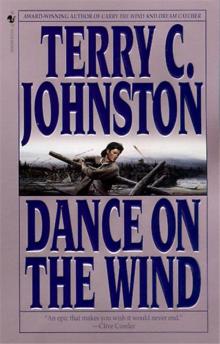 Dance on the Wind tb-1
Dance on the Wind tb-1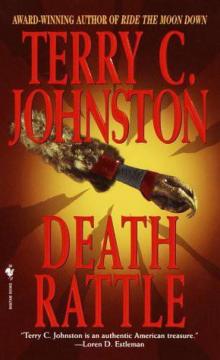 Death Rattle tb-8
Death Rattle tb-8 The Stalkers
The Stalkers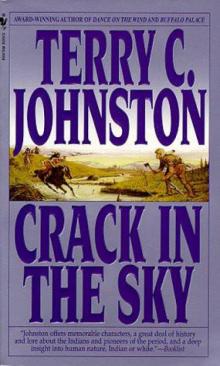 Crack in the Sky tb-3
Crack in the Sky tb-3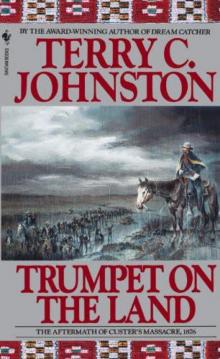 Trumpet on the Land: The Aftermath of Custer's Massacre, 1876 tp-10
Trumpet on the Land: The Aftermath of Custer's Massacre, 1876 tp-10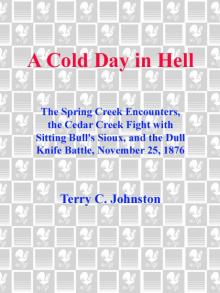 A Cold Day in Hell
A Cold Day in Hell Long Winter Gone: Son of the Plains - Volume 1
Long Winter Gone: Son of the Plains - Volume 1 Buffalo Palace
Buffalo Palace Cries from the Earth
Cries from the Earth Death Rattle
Death Rattle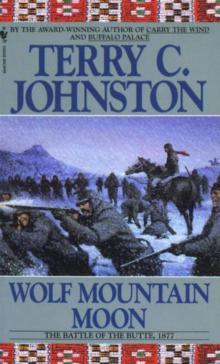 Wolf Mountain Moon: The Battle of the Butte, 1877 tp-12
Wolf Mountain Moon: The Battle of the Butte, 1877 tp-12 Crack in the Sky
Crack in the Sky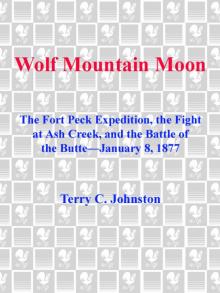 Wolf Mountain Moon
Wolf Mountain Moon Turn the Stars Upside Down: The Last Days and Tragic Death of Crazy Horse
Turn the Stars Upside Down: The Last Days and Tragic Death of Crazy Horse Winter Rain
Winter Rain Shadow Riders: The Southern Plains Uprising, 1873 (The Plainsmen Series)
Shadow Riders: The Southern Plains Uprising, 1873 (The Plainsmen Series)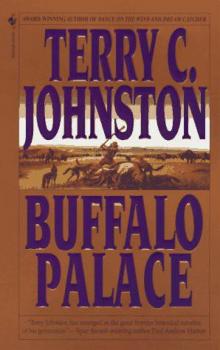 Buffalo Palace tb-2
Buffalo Palace tb-2 Cries from the Earth: The Outbreak Of the Nez Perce War and the Battle of White Bird Canyon June 17, 1877 (The Plainsmen Series)
Cries from the Earth: The Outbreak Of the Nez Perce War and the Battle of White Bird Canyon June 17, 1877 (The Plainsmen Series) Shadow Riders, The Southern Plains Uprising, 1873
Shadow Riders, The Southern Plains Uprising, 1873 Ashes of Heaven (The Plainsmen Series)
Ashes of Heaven (The Plainsmen Series) Ashes of Heaven
Ashes of Heaven Devil's Backbone: The Modoc War, 1872-3
Devil's Backbone: The Modoc War, 1872-3 Wind Walker tb-9
Wind Walker tb-9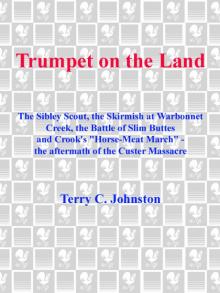 Trumpet on the Land
Trumpet on the Land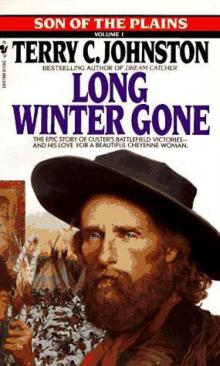 Long Winter Gone sotp-1
Long Winter Gone sotp-1 Dying Thunder
Dying Thunder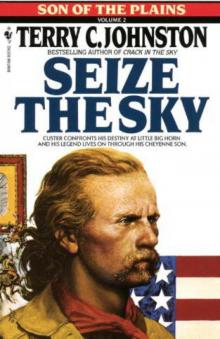 Seize the Sky sotp-2
Seize the Sky sotp-2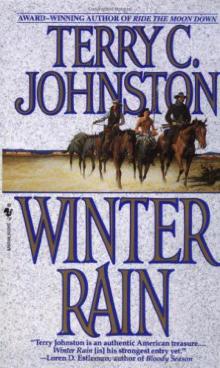 Winter Rain jh-2
Winter Rain jh-2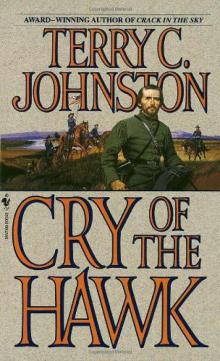 Cry of the Hawk jh-1
Cry of the Hawk jh-1 Sioux Dawn, The Fetterman Massacre, 1866
Sioux Dawn, The Fetterman Massacre, 1866 Sioux Dawn: The Fetterman Massacre, 1866 (The Plainsmen Series)
Sioux Dawn: The Fetterman Massacre, 1866 (The Plainsmen Series) Ride the Moon Down
Ride the Moon Down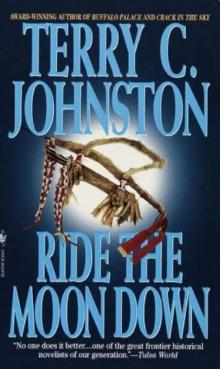 Ride the Moon Down tb-7
Ride the Moon Down tb-7 Red Cloud's Revenge
Red Cloud's Revenge Wind Walker
Wind Walker